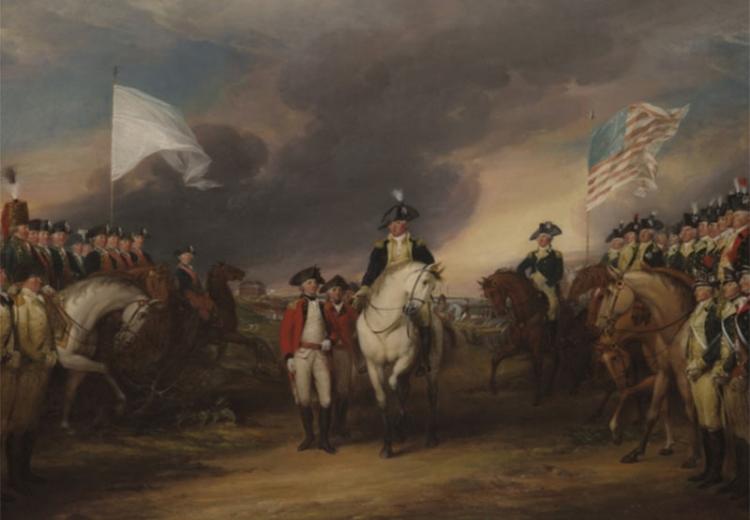Lesson 4: Leadership in Victory: One Last Measure of the Man

Cornwallis’s surrender at Yorktown.
George Washington's early military career (1754-1758)—during the Seven Years' War—was not uniformly successful. In his first battle, he and his men were ambushed and forced to surrender Fort Necessity on the Pennsylvania frontier. Washington's reputation for leadership and courage was based on his actions in another defeat at the hands of the French. In that battle, at Fort Duquesne (1755, often called the "Battle of the Wilderness" or "Braddock's Defeat"), Washington had two horses shot from under him and eventually had to assume command from the mortally wounded General Edward Braddock. Washington led the surviving British and Colonial soldiers on a successful retreat.
Later (1775-1783), Washington would lead the Patriots to a surprising victory over Great Britain, "…the best-trained, best-equipped fighting force in the Western world. …Although he lost most of his battles with the British, year after year he held his ragtag, hungry army together"—from the EDSITEment resource The American President.
What combination of experience, strategy, and personal characteristics enabled Washington to succeed as a military leader?
Guiding Questions
What qualities made George Washington an effective military leader?
How were the responsibilities of the Commander-in-Chief affected by conditions during the Revolutionary War?
How did Washington's responses to these challenges demonstrate his ability to handle a wide range of problems?
Learning Objectives
List qualities they believe made George Washington an effective military leader.
Discuss some difficulties Washington faced as Commander-in-Chief.
Summarize briefly the Newburgh Conspiracy.
Describe Washington's response to the Newburgh Conspiracy.
It was almost expected in the world of the late 18th century that the leader of a great military victory would be amply rewarded. But Washington refused any such reward. According to America's First Hero on the EDSITEment resource The American President:
"The very fact that he [Washington] refused to hold on to his military authority or to seek political or financial reward for his years of service astonished the country. And when word of it reached King George III of England he exclaimed, 'If true, then he is the greatest man in the world.'
"Two incidents after the Battle of Yorktown—but before a peace treaty was signed officially declaring an end to hostilities—tested Washington's resolve to refuse power in exchange for his military leadership. Keep in mind that, at this point, the army had not disbanded and had not been paid as promised. This combination of inactivity and injustice can easily breed dissatisfaction."
